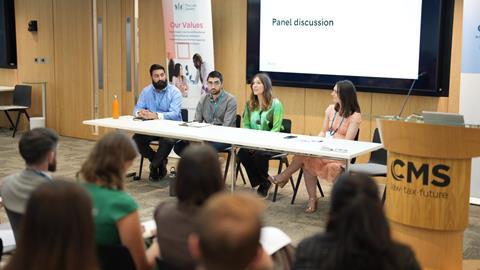The pace of technological change and the inexorable rise of generative AI, mental health and financial wellbeing were all prominent topics at this year’s Junior Solicitors Network Summit
The pressures and pace of change in the legal sector ensured the Junior Solicitors Network Summit had much to talk about. Panels covered financial wellbeing, resilience, networking, artificial intelligence and the future legal landscape.
The ‘data and tech literacy’ panel discussed emerging technologies and how junior lawyers could attempt to introduce new tech to their firms. As well as encouraging juniors to look into what tech would help their firm, panellists told juniors to think commercially when asking for new tech.
Jeff Wright, director of change and innovation at national firm Foot Anstey, urged the audience to ‘not be overwhelmed’ by the changing technological landscape.
Wright said: ‘The pace of technological change is huge. That gives you all a massive challenge in terms of getting to grips with technology, understanding what your firms can offer you but also just doing your job quicker. Wellbeing is massively important to the profession and technology is one way that could help you get there.’
The relationship between what generative AI could bring in terms of efficiencies and improvements, completing traditional junior lawyer tasks, presented an ‘interesting challenge’, Wright said.
‘A lot of functions the tech is performing is targeting some of those [tasks normally performed by juniors], the stuff you cut your teeth on. You learn the context of the law you practise through some of those tasks you do in the more junior roles, so taking them away presents a clear and present danger.
‘It is an existential threat to the ability of our younger lawyers to learn,’ he added. ‘It’s a huge challenge that we should not step away from or underestimate because you still need that group of senior lawyers and that level of talent coming through.’
Mishcon de Reya’s legal service and product lead Ella Krikler brushed off concerns: ‘I am less worried about people not having skills in 20 years to be able to do something. I just think the skillset of senior lawyers in 20 years will be different and that is not a bad thing.’
Oliver Jeffcott, senior legal technology and innovation manager at top-50 firm Macfarlanes, added: ‘Having that flexible growth mindset is such a critical part of the next five years. It is an exciting time, and a pretty exciting time for access to justice as… small firms have access [to generative technologies].’
Mental health and wellbeing are declared priorities for many law firms. Yet, last year, LawCare reported a 24% increase in the number of legal professionals contacting the mental health charity for support from January to August 2023 compared with the same period in 2022.
Speaking on the ‘resilience in the workplace’ panel, Esther Gamble, a barrister at No5 Barristers Chambers, advised junior lawyers to familiarise themselves with their workplace procedures and policies and to find the ‘go to’ person.
‘Look after yourself,’ she said. ‘If you’re stressed and sleep-deprived, everything seems worse and anything negative will affect you more.’
Donna Smith, director of Odonnata Growth and Transformation Coaching, said coping techniques for when things at work do not go well include ‘accepting [the cause of stress] for what it is… mine it for the good… [and] let the rest go.
‘Celebrate your achievements. I do not mean just the big ones, I mean the little ones, the everyday ones.’
Mental health was also discussed during the ‘financial wellbeing for juniors’ panel (pictured above) in which Wealthbrite founder Carla Hoppe told the audience that financial issues and mental health were linked.
She said: ‘If you are dealing with a pre-existing mental health condition, you are three-and-a-half times more likely to be struggling with problem debt. There is a very real link between money and mental health.
‘The top three ways lawyers tell us that worries about money manifest are anxiety, a lack of motivation, and sleepless nights. It doesn’t surprise me therefore that one in three think it’s affecting their performance at work.’
She recommended ‘looking after the systems that you have in place to support you’ and seeking out support that may already be on offer.
Jonathan Watmough, CEO and co-founder of HelpingLawyersThrive, sat on a panel discussing the future. The ‘enormous change’ brought by technology made for a ‘wonderful opportunity’, he said.
‘With AI, there has been enormous scaremongering. It is absolutely going to be the solution, not the problem. It will, in time, automate a lot of… the mundane tasks. The big question is how we train junior lawyers as a result.’
Watmough said in-house would continue to grow, wellbeing would continue to be a priority for firms, and technology would help complete lower-level tasks, allowing lawyers to focus on the growing complexities of cases.





































No comments yet